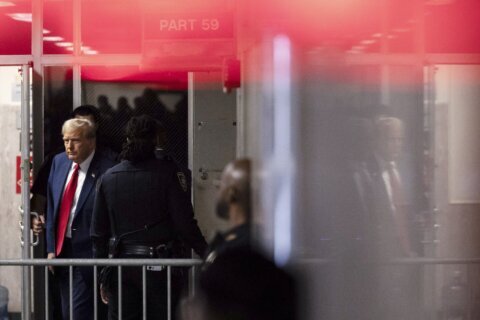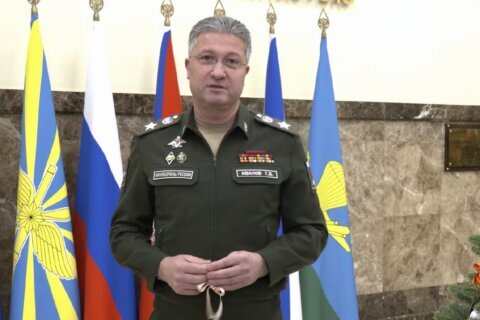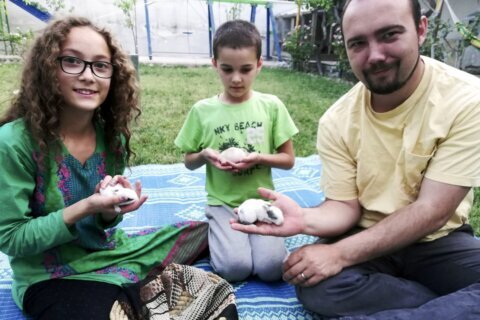MISSION SAN FRANCISCO DE ASIS, Honduras (AP) — First came Hurricane Eta. Then, Hurricane Iota, unleashing rains of biblical proportions on the hillside community of La Reina.
As Iota hammered La Reina for four days last fall, residents kept watch on the mountain above their 300 homes for signs that they should flee. Some left quickly when the downpour ceased.
Then, La Reina was gone, buried in an epic mudslide, its families among nearly half a million Central Americans displaced by the hurricanes. Bathed in tears and shaking with cold, the frightened and disoriented residents of La Reina wandered the main road at the bottom of the valley looking for help.
___
This story is part of a series, After the Deluge, produced with support from the Pulitzer Center on Crisis Reporting.
___
That’s when the Rev. Leopoldo Serrano arrived in his Franciscan robes like an answer to their prayers, ready to take charge — and ready, it would turn out, to make a deal with the devil to save the people of La Reina.
Serrano, a friar who ran a nearby drug rehabilitation center, understood they would have to act quickly if they were to keep families intact and the community from disintegrating. Something had to be done for the more than 1,000 people stranded in a valley marked by the poverty and drug violence that have driven so many Hondurans to the United States.
Serrano turned schools into shelters, looked for borrowed houses and organized a census of victims. He made hundreds of phone calls looking for help. Bags of food, clothes and medicine trickled in from relatives and churches abroad, but “the Honduran government did not even give us a tent,” Serrano said.
In any case, they would need more than tents. To rebuild their houses and replant their crops, the villagers needed land — and Serrano knew that much of that land was in the hands of drug traffickers.
So, the agent of God became a broker with agents of the underworld, many of whom were fighting each other for control of the land and lucrative drug routes from South America to Mexico and the United States. The pastor of souls turned into a project manager and construction foreman for the families of La Reina, building them a new town at Mission San Francisco de Asís.
Twenty-five years ago, the powerful local cartel run by Arnulfo Valle bought the 70 acres adjacent to the mission where Father Serrano hopes to put those displaced from La Reina.
When capos are arrested, the government confiscates whatever land is in their name and holds it in a byzantine bureaucracy. Heirs fight for control over hidden assets — land that has been put in the name of front men and women, sometimes without their knowledge. “The land itself is not worth that much, but the message of who is in control is everything,” Serrano explains.
Two weeks after the disaster, Serrano was publicly asking for land donations during Masses he broadcasts on Facebook. The way he tells it, Arnulfo Valle’s son, José Luis, contacted him and they arranged for a legal donation.
“My responsibility was only to legalize the situation. I hired a lawyer to identify the legal owner and we got them to donate it to the National Agrarian Institute,” which in turn would give houses and lots to La Reina’s people and common areas to the mission, Serrano said.
But the story is a little more complicated than that. It all turned on an intermediary with Jose Luis Valle: a young friar, Oveniel Garcia.
Garcia, who ran away from home at the age of 12 and became a drug addict, is a street-smart survivor. At 16, he got a job cleaning floors in a discotheque frequented by traffickers, where he met Jose Luis Valle.
“Bodyguards, women, weapons, drugs,” he recalls. “That same day I already knew who he was. The connection was immediate … He paid the owner of the place so that I could dedicate myself only to him.” They would spend many nights talking.
The closer they became the more Garcia learned about the Valle family business. He resisted Valle’s request to work for him, but eventually found himself carrying a weapon. He was well aware that almost no one gets out of the drug business alive, and he was scared.
He had heard Serrano’s call to drug traffickers to turn from evil to good, and he reached out. “The only way they could believe that I really wanted to disassociate myself and was not going to betray them was through a conversion,” he explains. “Otherwise they would have killed me.”
Garcia left Valle’s orbit and entered Serrano’s rehab center for seven months. Over the next few years, he became Serrano’s right-hand man in the mission. He largely kept his distance from Valle until December 2020.
It was then that Serrano told Garcia, “We need land. Call your friend.”
Valle agreed to give them the land, but he didn’t have the titles. “He had to put pressure on those who occupied it, they were usurpers. He would go there with weapons. There were deaths,” Garcia recounted, cryptically.
The signing and official transfer of the land took place on the last day of the year. On May 7, the first measurements were taken to mark out plots for houses.
And on May 28, the new inhabitants entered the farm to find narco squatters still occupying part of the land.
To evict them, men from La Reina moved in, armed only with machetes. They moved the squatters’ cattle out to the main road and, bit by bit, took possession of the land where they planned to build their new houses as part of the mission.
Each morning now, Serrano goes out to inspect the mission construction sites. A few men and women from La Reina have already begun to build three new homes and a group of apartments for widows with funds donated by churches. He checks on the type of stone they are using, takes measurements and coordinates the crews.
The workers put up windows, lay bricks and make cement. Each family must send one person to work on the construction of their home. They do not receive wages and if they don’t work, they must pay into a kitty about $6 a day (150 lempiras.)
Serrano soldiers on — raising money, advocating construction over migration, training the next generation of priests. He preaches good farming over evil drug trafficking.
He shared a WhatsApp message from an army coroner who urged him to be cautious: “Don’t keep talking about these people, Father, they will hurt you.”
Serrano was defiant. “They have weapons,” he replied, “if they wanted to kill me they would have done it already.”
And even his death would not stop the new town that was rising at Mission San Francisco de Asís, he insisted.
The friars he is training “can continue my work when I die.”
Copyright © 2024 The Associated Press. All rights reserved. This material may not be published, broadcast, written or redistributed.







